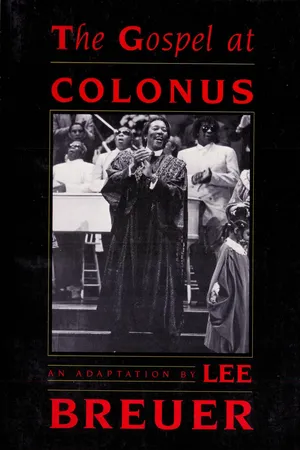
This is a test
- 64 pages
- English
- ePUB (mobile friendly)
- Available on iOS & Android
eBook - ePub
The Gospel at Colonus
Book details
Book preview
Table of contents
Citations
About This Book
A founding member of the acclaimed New York-based company Mabou Mines, Breuer's gifts as a writer and director have have made him a mainstay of the theatrical avant-garde.
Frequently asked questions
At the moment all of our mobile-responsive ePub books are available to download via the app. Most of our PDFs are also available to download and we're working on making the final remaining ones downloadable now. Learn more here.
Both plans give you full access to the library and all of Perlego’s features. The only differences are the price and subscription period: With the annual plan you’ll save around 30% compared to 12 months on the monthly plan.
We are an online textbook subscription service, where you can get access to an entire online library for less than the price of a single book per month. With over 1 million books across 1000+ topics, we’ve got you covered! Learn more here.
Look out for the read-aloud symbol on your next book to see if you can listen to it. The read-aloud tool reads text aloud for you, highlighting the text as it is being read. You can pause it, speed it up and slow it down. Learn more here.
Yes, you can access The Gospel at Colonus by Lee Breuer in PDF and/or ePUB format, as well as other popular books in Literature & American Drama. We have over one million books available in our catalogue for you to explore.
Information
PART
I
A Pentecostal church. Behind its elegant interior is a line of ancient Greek temple columns. A monolithic pillar stands down left. One holy place rises out of the ruins of another.
Far behind the pulpit, choir stalls rise, fixtured in gold, upholstered in green. Fans rest on the cushions. A white staircase descends to a wide landing and from there, by three steps, to a mosaic floor that sets the space aglow with color like cathedral windows. Next to the Choir is a gospel band fronted by a Hammond organ. Center stage is a grand piano gleaming white but now covered by a tapestry. On the blue cloth is a vase of gladiolas.
The forefront of the stage displays five carved benches upholstered in red plush—these are for the Deacons. For the Preacher and the Evangelist, two similarly carved and upholstered highbacked chairs.
From floor to flies, serving as a cyclorama, is a great painting of the Last Judgment, a Judgment more Rousseau than Renaissance, more Africa than Europe, in which all the planets, plants, insects, animals and human beings rise toward us from a panorama so far below as to show the curvature of the earth—part Eden, part Colonus’ sacred grove.
A worship service is about to begin. An organist plays and a Choir enters, severally and in pairs, greeting one another. Their robes are a mélange of motifs: church Sunday, African, Greek. Some wear headscarves, other sashes. Many have handkerchiefs tied to their wrists. One carries African finger cymbals, another a tambourine.
The band appears. Between Choir and band members there are warm greetings. A professional gospel Quintet, stylishly uniformed, enters after the Choir. Guests of the church for this special service, the singers create a stir. Then comes the Evangelist in yellow, who takes her place high on the soloists’ platform. She is followed by the Pastor in a white suit. Finally, as the house dims and the stage brightens, the Preacher enters with a leather-bound text, which he places on the pulpit and thumbs the leaves thereof. A hush falls over the assembly as he finds his place and reads.
THE WELCOME AND QUOTATIONS
PREACHER:
Think no longer that you are in command here,
But rather think how, when you were,
You served your own destruction.
Welcome, brothers and sisters.
I take as my text this evening the Book of Oedipus.
(He begi...
Table of contents
- Cover
- Title Page
- Copyright
- Dedication
- Contents
- ACKNOWLEDGMENTS
- PREFACE
- NOTE ON PERFORMANCE
- NOTE ON PRODUCTION
- ABOUT THE PLAY
- CHARACTERS
- PART I
- PART II